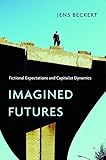Imagined futures : fictional expectations and capitalist dynamics / Jens Beckert.
Material type: TextPublication details: Cambridge, Massachusetts : Harvard University Press, (c)2016.Description: 1 online resource (ix, 373 pages) : illustrationsContent type:
TextPublication details: Cambridge, Massachusetts : Harvard University Press, (c)2016.Description: 1 online resource (ix, 373 pages) : illustrationsContent type: - text
- computer
- online resource
- 9780674545878
- HB501 .I434 2016
- COPYRIGHT NOT covered - Click this link to request copyright permission: https://lib.ciu.edu/copyright-request-form
| Item type | Current library | Collection | Call number | URL | Status | Date due | Barcode | |
|---|---|---|---|---|---|---|---|---|
 Online Book (LOGIN USING YOUR MY CIU LOGIN AND PASSWORD)
Online Book (LOGIN USING YOUR MY CIU LOGIN AND PASSWORD)
|
G. Allen Fleece Library ONLINE | Non-fiction | HB501 (Browse shelf(Opens below)) | Link to resource | Available | ocn950613689 |
Includes bibliographies and index.
Introduction -- Part One: Decision-making in an uncertain world -- The temporal order of capitalism -- Expectations and uncertainty -- Fictional expectations -- Part Two: Building blocks of capitalism -- Money and credit: the promise of future value -- Investments: imaginaries of profit -- Innovation: imaginaries of technological futures -- Consumption: value from meaning -- Part Three: Instruments of imagination -- Forecasting: creating the present -- Economic theory: the crystal ball of calculative devices -- Conclusion: the enchanted world of capitalism.
"Imagined Futures offers a new explanation for the dynamics of modern capitalism and the restlessness of our economy, based on our temporal orientation. Building on a historical account of how competition and the credit system have forced actors to orient their decisions towards a future that is portrayed and perceived as offering both limitless opportunities and immeasurable risks, Beckert shows how the uncertainty inherent in the future pressures actors to form expectations of distinct outcomes and prevents them from calculating optimal decisions. But how do actors make decisions in a world that contains such fundamental uncertainty? Beckert argues that decisions in the economy are based on imaginaries of the future, which he calls fictional expectations, which allow us to act as if we know the future, providing the reassurance needed to embrace endeavors whose outcomes are unknowable. Beckert shows how these fictional expectations are the underlying force that propels the economy, from investments and the operation of the monetary system to innovations and the purchase of new consumer goods, and how economic crises ensue when these fictional expectations collapse. With its focus on the role of expectations in the economy, Imagined Futures addresses the central macro-level question in the history of the social sciences: What are the sources of the epic growth and repeated crises in modern capitalism?"--Provided by publisher.
COPYRIGHT NOT covered - Click this link to request copyright permission:
There are no comments on this title.
